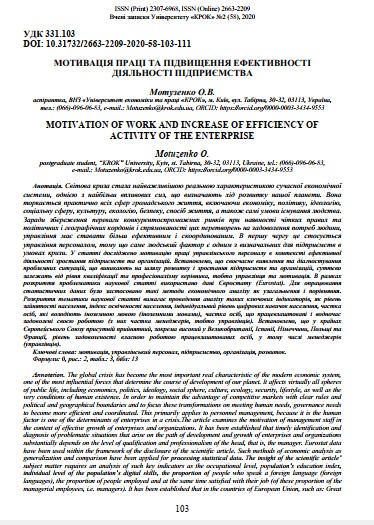MOTIVATION OF WORK AND INCREASE OF EFFICIENCY OF ACTIVITY OF THE ENTERPRISE
DOI:
https://doi.org/10.31732/2663-2209-2020-58-103-111Keywords:
motivation, management staff, enterprise, organization, developmentAbstract
The global crisis has become the most important real characteristic of the modern economic system, one of the most influential forces that determine the course of development of our planet. It affects virtually all spheres of public life, including economics, politics, ideology, social sphere, culture, ecology, security, lifestyle, as well as the very conditions of human existence. In order to maintain the advantage of competitive markets with clear rules and political and geographical boundaries and to focus these transformations on meeting human needs, governance needs to become more efficient and coordinated. This primarily applies to personnel management, because it is the human factor is one of the determinants of enterprises in a crisis.The article examines the motivation of management staff in the context of effective growth of enterprises and organizations. It has been established that timely identification and diagnosis of problematic situations that arise on the path of development and growth of enterprises and organizations substantially depends on the level of qualification and professionalism of the head, that is, the manager. Eurostat data have been used within the framework of the disclosure of the scientific article. Such methods of economic analysis as generalization and comparison have been applied for processing statistical data. The insight of the scientific article’ subject matter requires an analysis of such key indicators as the occupational level, population’s education index, individual level of the population’s digital skills, the proportion of people who speak a foreign language (foreign languages), the proportion of people employed and at the same time satisfied with their job (of these proportion of the managerial employees, i.e. managers). It has been established that in the countries of European Union, such as: Great Britain, Spain, Germany, Poland and France, there is an acceptable, in particular high level of satisfaction of their own job by employed persons, including managerial employees (managers).
Downloads
References
Buble, M. Juras, A. and Matic, I. (2014), “The relationship between managers’ leadership styles and motivation”, Management, 19, p. 161–193.
Chromjakova, F. (2016), “The Key Principles of Process Manager Motivation in Production and Administration Processes in an Industrial Enterprise”, Journal of Competitiveness, 8(1), p. 95–110. DOI: 10.7441/joc.2016.01.07.
Decoene, V. and Bruggeman, W. (2006), “Strategic alignment and middle‐level managers’ motivation in a balanced scorecard setting”, International Journal of Operations & Production Management, №26(4), р. 429–448. https://doi.org/10.1108/01443570610650576.
Delmar, F. and Wiklund, J. (2008), “The Effect of Small Business Managers’ Growth Motivation on Firm Growth: A Longitudinal Study”, Entrepreneurship Theory and Practice, №32(3), р. 437–457.
Eurostat. URL: https://ec.europa.eu/eurostat/.
Gillan, S. L. Hartzell, J. C. Koch, A. and Starks, L. T. (2010), “Firms’ Environmental, Social and Governance (ESG) Choices, Performance and Managerial Motivation”, Unpublished working paper, 10. URL: https://www.researchgate.net/profile/Maretno_Harjoto/publication/265849879_Board_Diversity_and_Corporate_Social_Responsibility/links/56024b2e08aeb30ba7355cda.pdf.
Ke, W. Tan, C-H. Choon-Ling, S., Kwok-Kee, W. (2012), “Inducing Intrinsic Motivation to Explore the Enterprise System: The Supremacy of Organizational Levers”, Journal of Management Information Systems, №29(3), р. 257–290. DOI : https://doi.org/10.2753/MIS0742-1222290308.
Laura, L. Paglis, Stephen, G. Green (2002), “Leadership self efficacy and managers’ motivation for leading change”, Journal of Organizational Behavior, №23(2), p. 215–235. DOI: https://doi.org/10.1002/job.137.
Li, Q. (2015), “The Discussion of Theory Review and Practice on Enterprise Executives Incentive”, Journal of Human Resource and Sustainability Studies, №3(1), p. 51–55. DOI: 10.4236/jhrss.2015.31008.
Maslen, S. and Hopkins, A. (2014), “Do incentives work? A qualitative study of managers’ motivations in hazardous industries”, Safety Science, №70, p. 419–428. https://doi.org/10.1016/j.ssci.2014.07.008.
Rusetski, A. (2011), “Getting Proactive: Cultural And Procedural Drivers Of Managerial Motivation To Act”, Journal of Business & Economics Research, № 9(1), p. 111–120.
Schmid Mast, M., Hall, J. A., Schmid, P. C. (2010), “Wanting to Be Boss and Wanting to Be Subordinate: Effects on Performance Motivation”, Journal of Applied Social Psychology, №40 (2), p. 458–472. DOI : 10.1111/j.1559-1816.2009.00582.x.
Wziatek-Stasko, A. (2016), “The extent of managers’ motivation as a determinant of leadership quality”, Economics and Management, №8(1), p. 37–46. DOI: 10.1515/emj-2016-0004.


